The Journey of Chinese Enterprises Globalization: The Special Forum on Risks and Challenges Behind Business Opportunities Successfully Concluded | Dacheng · Event Report
Release date:2024-12-01
In the context of deepening global economic integration and the coexistence of international cooperation and competition, Chinese enterprises are standing at a new historical starting point, facing unprecedented vast opportunities as well as severe challenges brought by a complex and changing international environment. To explore this era's topic in depth and provide strong support for Chinese enterprises to navigate the waves in the process of globalization, on the afternoon of November 29,taking the opportunity of the "Open Cooperation, Overseas Innovation for the Future - Co-building the 'Belt and Road' and Overseas Legal Services Exchange and Connection Conference", the Beijing Dacheng (Shanghai) Law Firm held the"Age of Exploration: Opportunities and Challenges for Chinese Enterprises Going Global"forum successfully concluded. This forum was divided into two parallel sessions, with the first topic focusing on"The Globalization Journey of Chinese Enterprises: Risks and Challenges Behind Business Opportunities"theme, where several industry experts and representatives conducted in-depth analysis and discussion on key issues, aiming to provide precise and practical strategic advice for Chinese enterprises to steadily advance into the global market.
Chen Jun, Deputy Director of Dacheng China Regional Committee and Executive Director of Dacheng ShanghaiLawyer delivered the opening speech. Lawyer Chen Jun first warmly welcomed and sincerely thanked the guests who came from afar, and highly praised the courage and determination shown by Chinese enterprises in the process of globalization. He pointed out that the presence of Chinese enterprises has spread across the globe, becoming an important force in promoting world economic development. However, the path for enterprises to go global is not smooth, facing many risks and challenges. In his speech, Lawyer Chen Jun emphasized that professional legal service teams play a crucial role in this process. They need to provide precise legal guidance for Chinese enterprises, helping them effectively avoid various risks and ensuring stable progress in overseas markets. Lawyer Chen Jun hopes that this forum can become an opportunity for deep dialogue and cooperation that transcends borders and integrates diverse wisdom, contributing to the brilliant shine of Chinese enterprises on the global stage.Chen Jun, Deputy Director of Dacheng China Regional Committee and Executive Director of Dacheng Shanghai
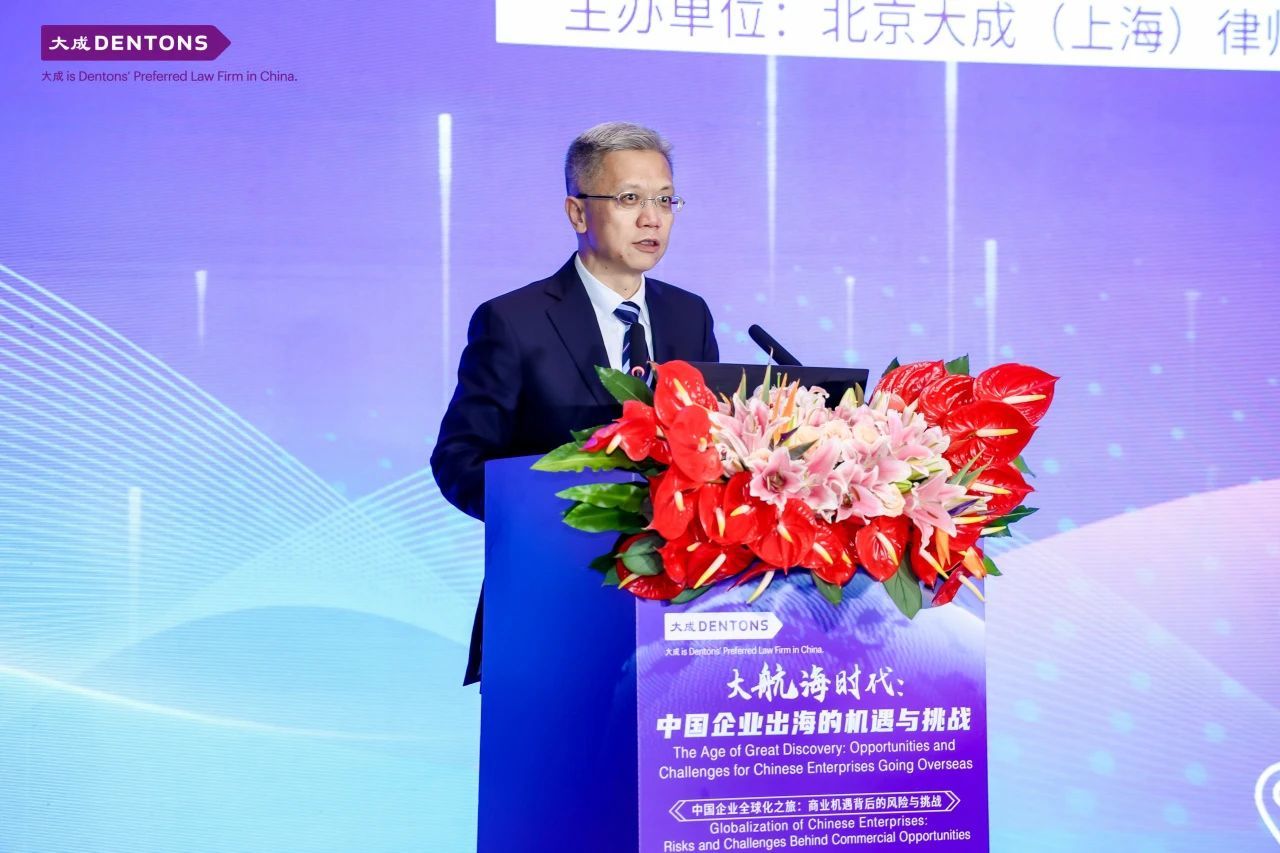
TMF Group
Global Business Development DirectorJoyce WangMs. Wang brought"2024 GBCI (Global Business Complexity Index) Report Trends"sharing. First, Ms. Wang briefly introduced the background of TMF Group, emphasizing its leading position in the global enterprise service field. She then detailed the key findings of the 2024 GBCI report. The report comprehensively assessed and ranked 79 jurisdictions, analyzing three core areas of enterprise management. Ms. Wang particularly pointed out that due to the complexity of laws and regulations and the high demands of digital development, Greece was rated as the jurisdiction with the highest global business complexity; while the Cayman Islands, due to its relatively simple business environment, has been rated as the region with the lowest business complexity for three consecutive years. Next, Ms. Wang delved into the complexities of accounting and taxation. She mentioned that more and more jurisdictions are beginning to implement strict tax invoice management requirements, while the time required to open bank accounts globally is continuously increasing. These changes require enterprises to constantly adjust and optimize internal processes to ensure compliance with new regulatory requirements. Secondly, Ms. Wang discussed new trends in compensation management and human resources. She pointed out that with the rising cost of living, more and more jurisdictions require enterprises to regularly raise employee salaries to ensure the living standards of employees and the stability of domestic employment. Finally, Ms. Wang also talked aboutthe profound impact of geopolitical tensions on the business environment. She emphasized that in the current context of continuous adjustments in the global supply chain, the five bridge economy countries play a crucial role. In the face of this complex and changing business environment, Ms. Wang encouraged enterprises to pay more attention to compliance operations and risk management to flexibly respond to various challenges and opportunities. Ms. Wang encouraged enterprises on their global voyage to pay more attention to compliance operations and risk management to flexibly respond to various unknown challenges and opportunities, seeking stable development in an uncertain environment.TMF Group Global Business Development Director Joyce WangThe theme of the roundtable discussion was
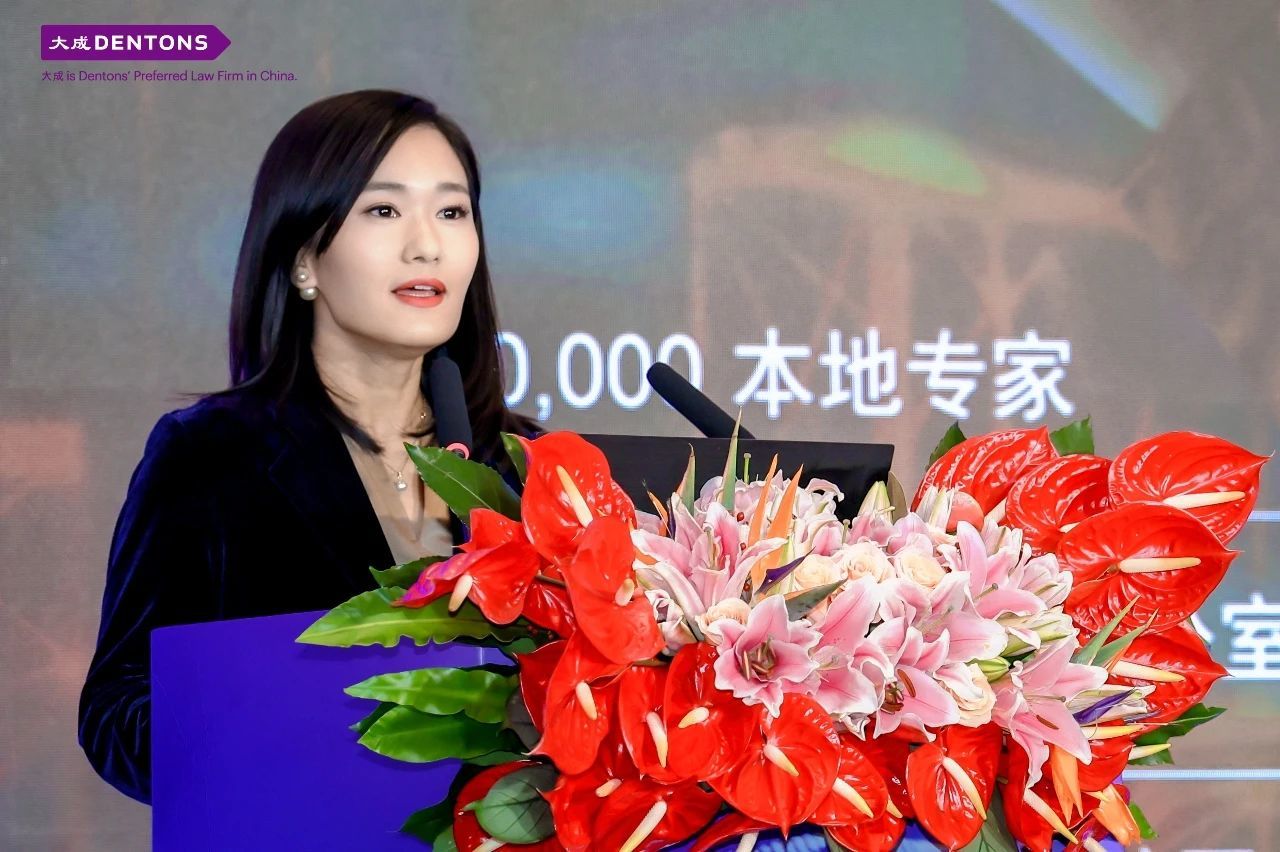
"Local Legal Issues that Chinese Enterprises Need to Pay Attention to When Investing Overseas"
, hosted by Dacheng Shanghai partnerLawyer Qu Feng. The participating guests included Dentons Singapore Office partnerGuo Lingyi, Dentons Indonesia Office partnerPak Al Hakim Hanafiah, Dentons India Office partnerSantosh Pai, Dentons Philippines Office partnerVirginia Viray, and Pisut and Partners Thailand Office partnerWayu Suthisarnsuntorn. These countries are from the ASEAN region and the Asia-Pacific region, which are also the focus of Chinese enterprises when investing overseas, especially regarding investment destinations and host countries. As the host, Lawyer Qu set up dialogue sessions focusing on the common and unique concerns of Chinese enterprises going global, including the choice of legal entities for investment in the country, joint venture relationships and common risks, factory establishment and supply chain layout, and how to face and respond to compliance risks. The five overseas guests pointed out in their sharing that there are significant differences in legal systems, regulatory requirements, and cultural backgrounds among different countries, which requires Chinese enterprises to fully understand and adapt to these legal, policy, and cultural differences to avoid risks arising from legal compliance issues. The guests shared specific legal compliance advice from different perspectives, including how to choose the legal entity organization form, how to conduct wholly-owned or joint ventures, rules of joint venture relationships, how to strengthen due diligence, improve transaction contract terms, and establish compliance systems. During the dialogue session, they encouraged and reminded Chinese enterprises that in the process of overseas investment, they should not only focus on business opportunities but also pay attention to legal compliance to achieve sustainable development. Finally, it is believed that the rich experience and content of this dialogue session will provide and suggest to Chinese enterprises, especially those going to ASEAN or the Asia-Pacific region, to highly value the legal environment of the target country and pay attention to the economic and trade relationships with opportunities, which is the cornerstone for ensuring the steady overseas investment of Chinese enterprises.Roundtable Discussion (from left to right)Dacheng Shanghai Partner Qu FengDentons Singapore Office Partner Guo LingyiDentons Indonesia Office Partner Pak Al Hakim Hanafiah
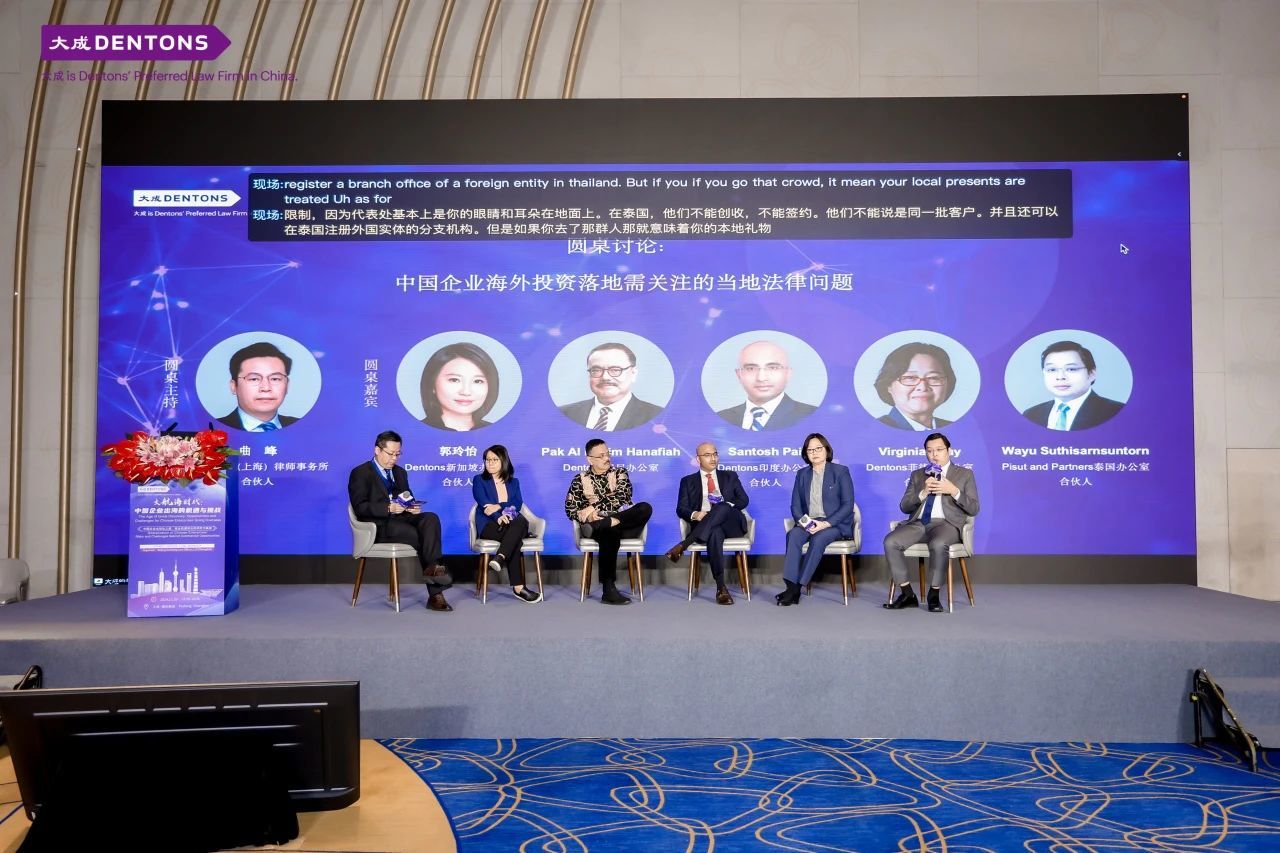
Dentons India Office Partner Santosh Pai
大成上海合伙人 曲峰
Dentons新加坡办公室合伙人 郭玲怡
Dentons印尼办公室合伙人 Pak Al Hakim Hanafiah
Dentons印度办公室合伙人 Santosh Pai
Virginia Viray, Partner at Dentons Philippines Office
Partner at Pisut and Partners Thailand Office
Dentons Singapore Office Partner Guo Lingyi
Vice President of the China-Africa Friendship Association and Chairman of Shanghai Dazhi Road Holding GroupHe LiehuiMr. bringsthe keynote speech on 'Major Challenges Faced by Chinese Enterprises in Overseas Operations (Localization)'.President He Liehui first introduced his company's rich experience in Africa. Over more than 20 years of deep cultivation in Africa, he has not only participated in a large number of infrastructure projects but has also been committed to cultural exchanges between China and Africa. He then emphasized the importance of localization in overseas operations of Chinese enterprises. He pointed out that for Chinese enterprises to go global, they must first find suitable markets, engage in suitable industries, operate in appropriate locations, and always find ways to maintain their relative advantages. However, localization is not an easy task. President He detailed several major challenges faced by Chinese enterprises in overseas operations: First, they must deeply understand the target market. He emphasized that enterprises should conduct thorough investigations and not make decisions based solely on third-party information. Second, they must comply with local laws and regulations and operate legally and compliantly. President He pointed out that many African countries have restrictions on foreign investment and foreign operations, with some industries reserved for local enterprises and citizens. At the same time, during operations, they must strictly adhere to local laws and regulations, including the legality of goods entering the country, capital outflows, and personnel entry and exit. Third, they must avoid homogeneous competition. As more Chinese enterprises go overseas, homogeneous competition is becoming increasingly fierce. President He suggested that enterprises should avoid this competition through differentiated cooperation. He noted that many African countries have incomplete industrial chains and industrial systems, and Chinese enterprises can leverage their advantages to form different parts of the industrial chain and jointly promote local industrial development. Fourth, they should pay attention to cross-cultural communication. President He mentioned that the African people highly value their friendship with the Chinese people, but for Chinese enterprises to develop long-term in Africa, they need to learn cross-cultural communication. This includes understanding local cultural customs, values, and respecting local cultural traditions and religious beliefs. Only in this way can they better integrate into local society and win the trust and support of local people.
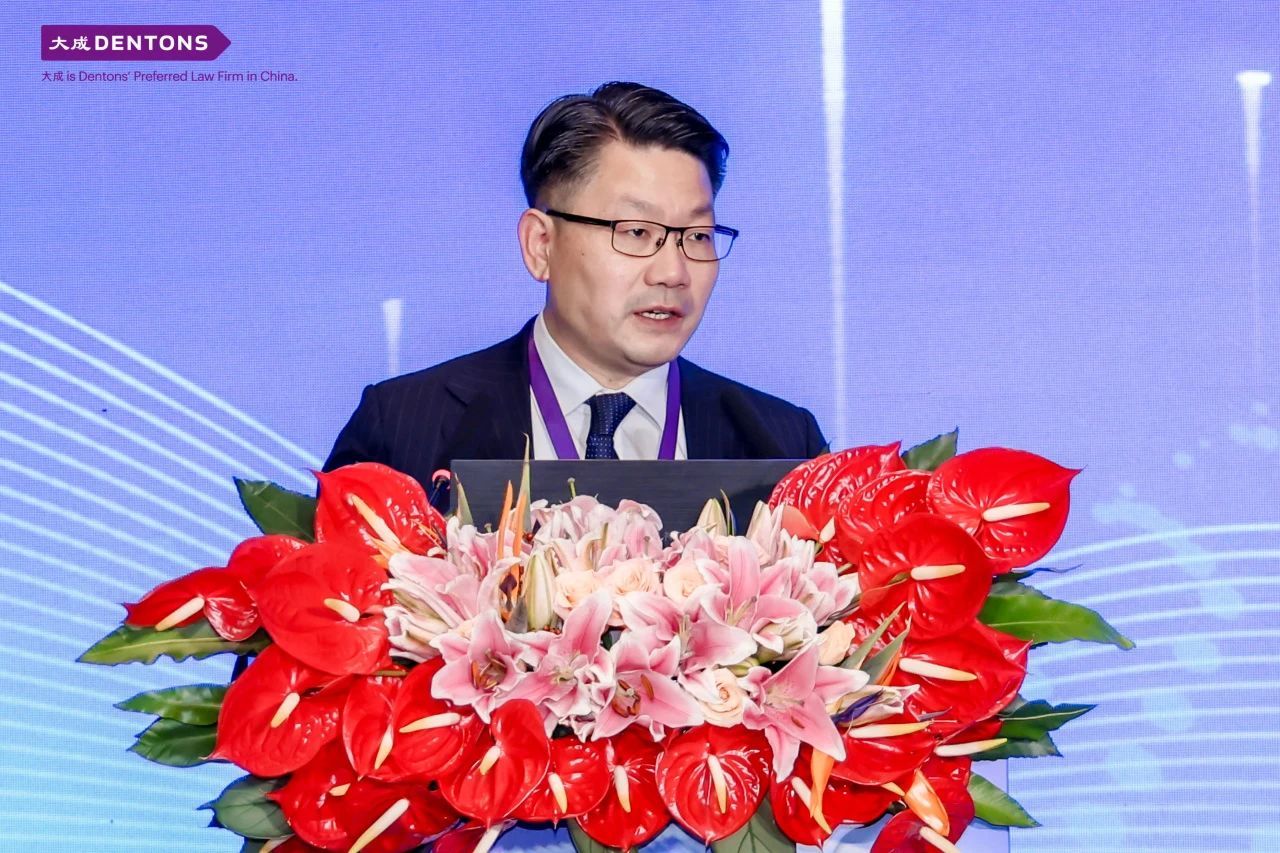
Vice President of the China-Africa Friendship Association
He Liehui, Chairman of Shanghai Dazhi Road Holding Group
Alia Zhang, Head of the Accounts Receivable Team for Atradius China in the Asia-Pacific and Middle East regionsAlia Zhangwiththe theme 'Promoting Trade, Managing Risks - Safeguarding Enterprises Going Global'delivered a keynote presentation. First, Ms. Zhang provided a profound analysis of the current international trade environment and elaborated on how enterprises can build a comprehensiverisk management system.She suggested that enterprises should first establish a sound credit assessment mechanism and conduct strictcredit investigationson potential clients. At the same time, enterprises should formulate flexible credit policies and adjust transaction conditions based on the credit status of clients. Subsequently, Ms. Zhang shared Atradius China's practical experience in accounts receivable collection, detailing the collection processes and methods of Atradius Collections, including how to effectively recover debts through multi-channel communication, legal means, and utilizing Atradius's unique international collection network. She also emphasized the importance of integrating with local culture and legal environments to ensure the smooth progress of collection work. Finally, Ms. Zhang provided a series of practical suggestions for specific issues that enterprises may encounter during their overseas operations. She advised enterprises to fully understand the legal regulations and business practices of the target market before going global to avoid misunderstandings and conflicts due to cultural differences. Additionally, enterprises should establish a sound credit management system and accounts receivable management system to ensure the safety of the entire process from order to cash (OTC). Furthermore, Ms. Zhang encouraged enterprises to strengthen cooperation with professional institutions like Atradius to obtain more comprehensive risk protection and collection support.OTC(from order to cash) process.
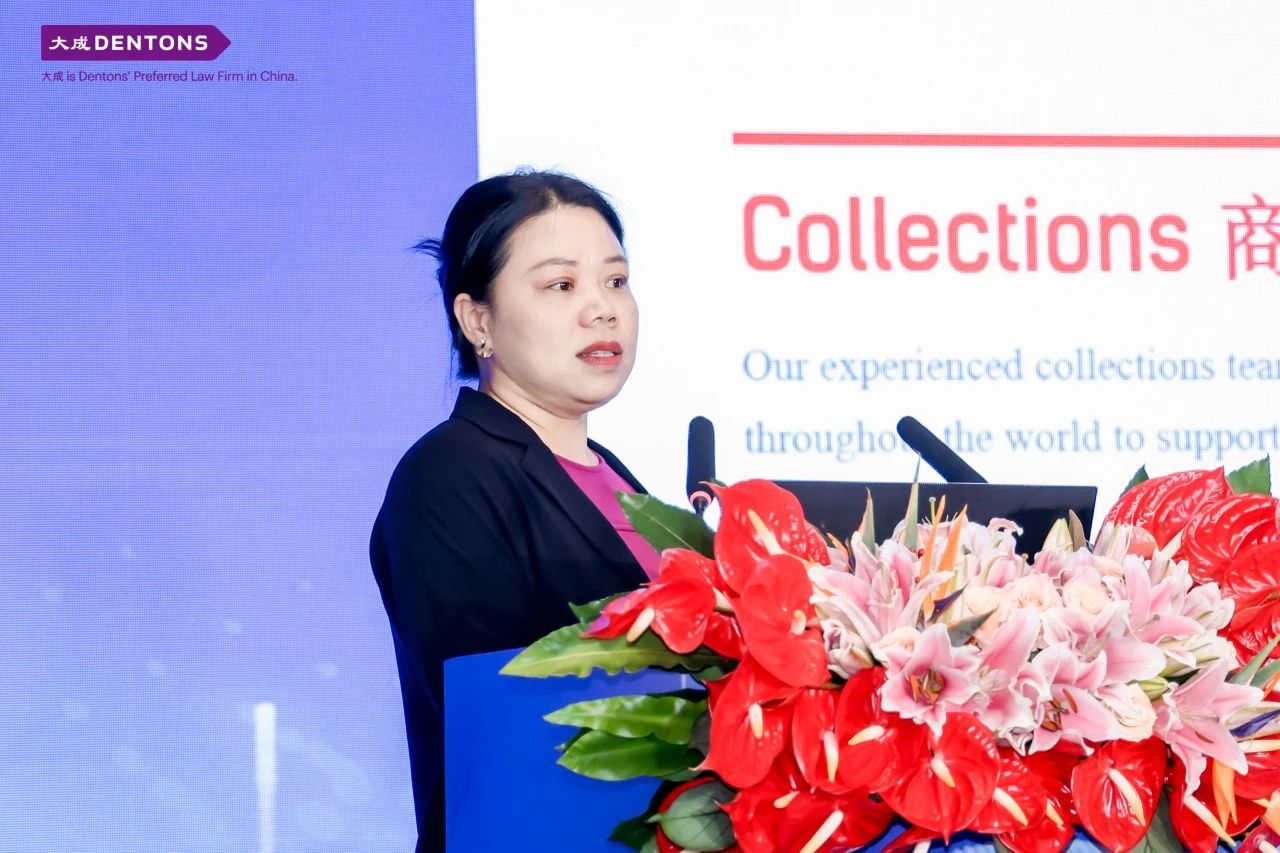
Alia Zhang, Head of the Accounts Receivable Team for Atradius China in the Asia-Pacific and Middle East regions
Alia Zhang
Professor Si Junyan from Dacheng Shanghai ConsultingSi Junyandelivered a keynote speech -'EPC+F Model: Financing Innovation and Risk Control for Global Renewable Energy Projects'.First, Attorney Si elaborated on the application and practice of the EPC+F model through several typical cases and introduced common financing methods of the EPC+F model, including equity financing, debt financing, and advance payment by the EPC party. When discussing risk identification and control of the EPC+F model, Attorney Si emphasized the importance of risk management. She pointed out that the international engineering EPC+F model faces numerous risks, including legal and financial risks, market and policy risks, operational management and supply chain risks, etc. Therefore, during project execution, risks should be allocated among the parties involved through contracts and other transaction documents, and due diligence should be conducted on the project's legal environment to ensure the project's legality and compliance. Subsequently, regarding how to optimize risk control of the EPC+F model, Si Junyan suggested effectively utilizing funds, including fundraising, allocation, usage, and recovery; implementing project management in phases, diversifying financing channels, strengthening supply chain cost management, and building a scientific risk response system to enhance risk warning and handling capabilities. Finally, Attorney Si looked forward to the development trend of the EPC+F model. She stated that as global demand for renewable energy and infrastructure investment increases, the EPC+F model will continue to develop and innovate, placing greater emphasis on risk management and financing innovation. At the same time, the combination of green finance and renewable energy projects will provide new opportunities for the EPC+F model, promoting the development of green low-carbon enterprises and the achievement of dual carbon goals.
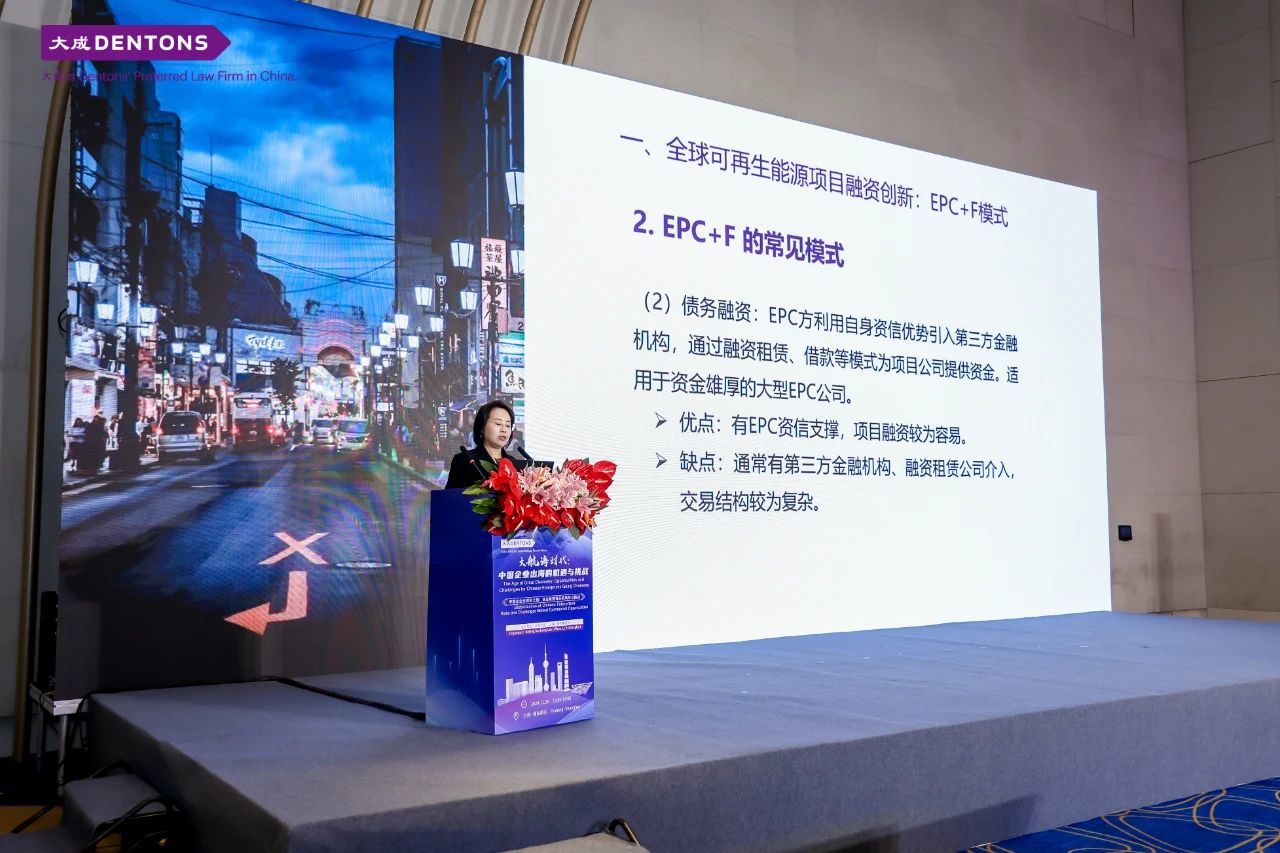
Si Junyan, Dacheng Shanghai Consulting
, hosted by Dacheng Shanghai partner'What kind of overseas industrial parks are suitable for Chinese enterprises to settle and develop overseas?'Guo LingyiWu JingjingLawyer. The guests participating in the discussion included Dacheng Shanghai PartnerGuo YulanLawyer, Executive Director of Colliers International's China Global Services Department and China Regional DirectorWang PeiMr., Deputy General Manager of the China-Indonesia Dual Park Batan Industrial ParkMeng YuanyuMs., Operations Manager of Dubai Meydan Free Trade ZoneMa YaoMr. Dacheng Shanghai PartnerYang AoshangLawyer.
At the meeting,Wu JingjingThe lawyer provided a detailed introduction from two aspects: Brazil's investment environment and representative economic zones. She pointed out that Brazil, as one of the BRICS countries, maintains close trade relations with China. Both China and Brazil have signed multiple bilateral agreements covering various fields, and their cooperative relationship has reached unprecedented heights. In the investment sector, Chinese investment hotspots are concentrated in infrastructure, rail transit, energy and new energy, natural resources and minerals, as well as agriculture. Lawyer Wu Jingjing also specifically introduced the Manaus Free Trade Zone in Brazil, which, due to its advantageous geographical location and federal government's investment tax incentive policies, has become the largest free trade zone in Brazil. At the same time, she also highlighted the risks associated with investing in Brazil and provided relevant investment report requirements.
During the discussion, the guests engaged in a lively debate around the theme. They unanimously agreed that Chinese enterprises need to comprehensively consider multiple factors such as geographical location, infrastructure, and policy environment when investing overseas. Choosing the right industrial park is crucial for the overseas establishment and long-term development of enterprises. Additionally, the guests emphasized the importance of strengthening cooperation with local governments. From a legal perspective, the guests reminded Chinese enterprises to deeply understand the local legal system and investment policies during the overseas investment process to ensure compliance. Furthermore, during the discussion, the guests expressed that through cooperation and exchange with internationally advanced industrial parks, advanced technology and management experience can be introduced to enhance the competitiveness of local industrial parks. At the same time, promoting industrial upgrading is also key to increasing the attractiveness of industrial parks.
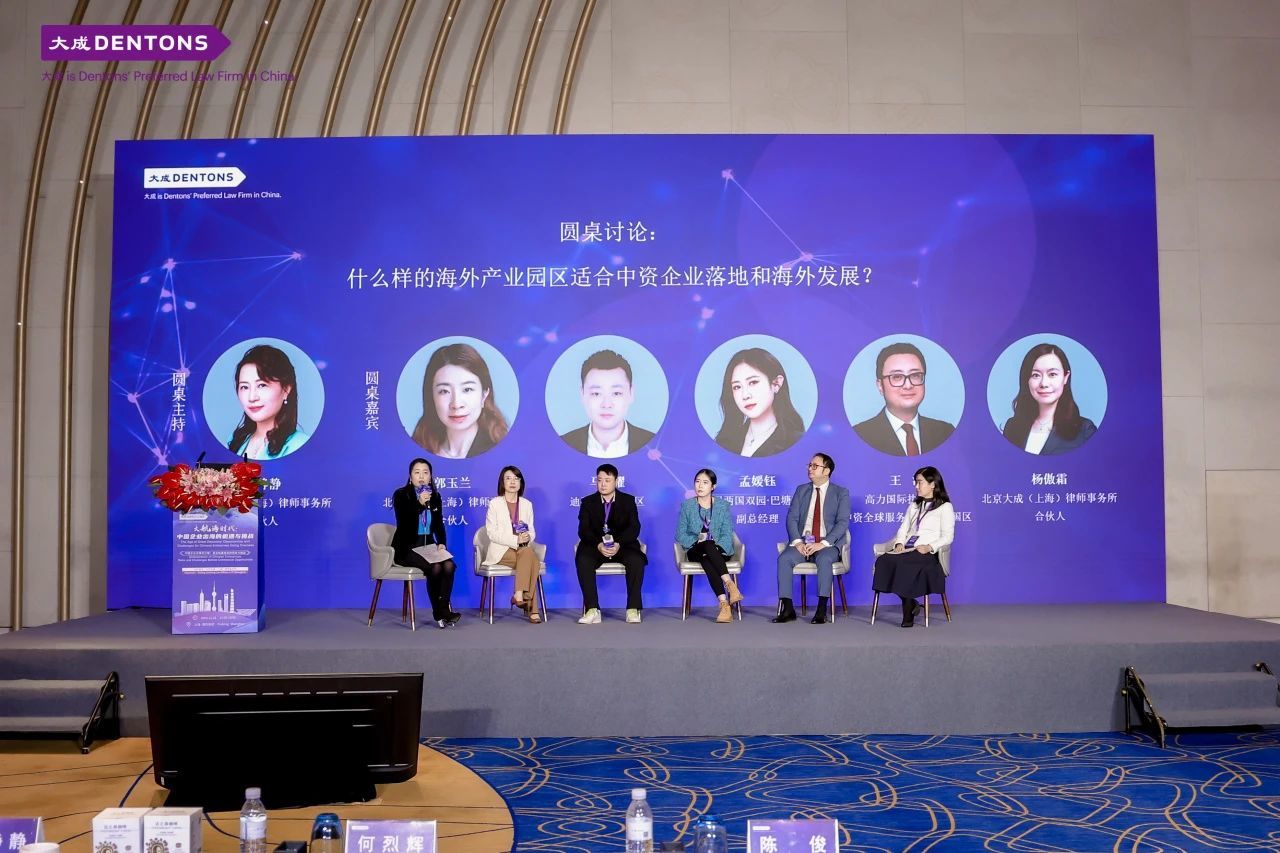
Dentons India Office Partner Santosh Pai
Wu Jingjing, Partner at Dacheng Shanghai
Guo Yulan, Partner at Dacheng Shanghai
Wang Pei, Executive Director of Global Services Department and China Region Director at Colliers International
Meng Yuanyu, Deputy General Manager of China-Indonesia Dual Park · Batang Industrial Park
Ma Yao, Operations Manager of Dubai Meydan Free Trade Zone
Yang Aoshang, Partner at Dacheng Shanghai
This forum was hosted by Li Mengyun, Partner at Dacheng Shanghai.
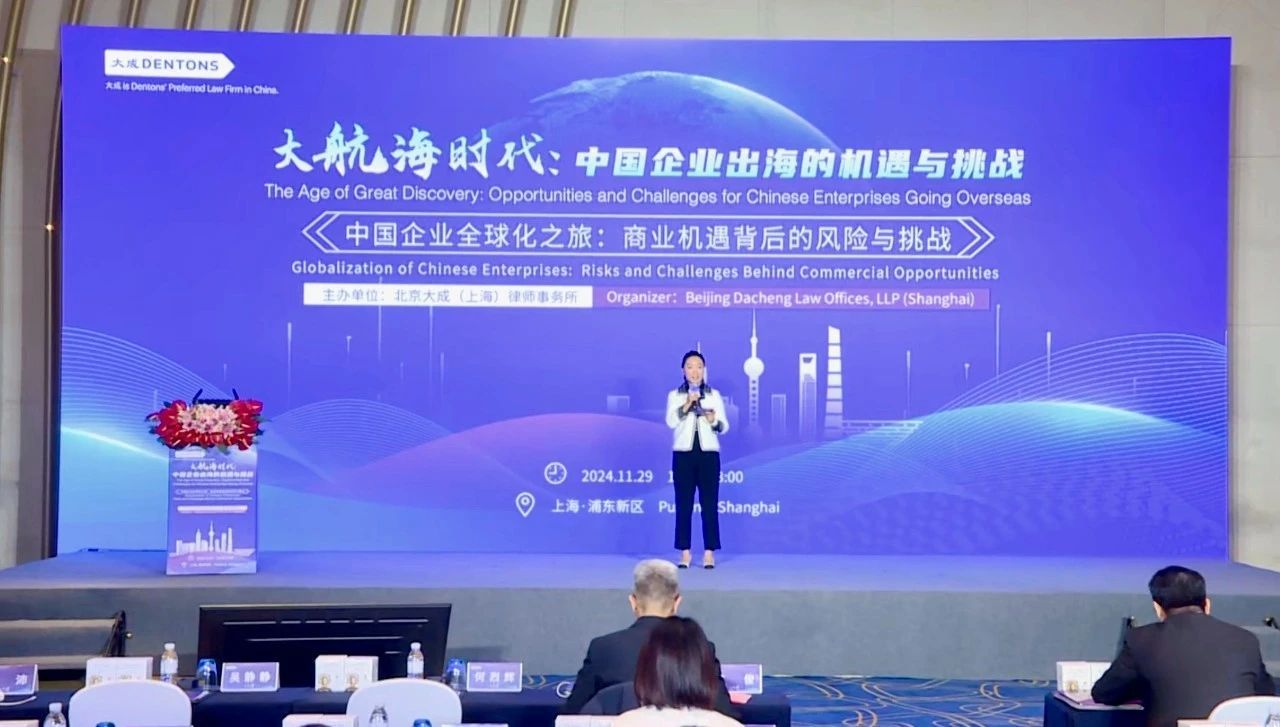
Li Mengyun, Partner at Dacheng Shanghai
Thus, the special forum "The Globalization Journey of Chinese Enterprises: Risks and Challenges Behind Business Opportunities" successfully concluded. During the forum, all participants actively spoke, exchanged ideas, and contributed wisdom, collectively strategizing for the globalization path of Chinese enterprises, presenting a feast of intellectual collision and wisdom integration. In the future, Dacheng Shanghai will continue to work hand in hand with industry colleagues, uphold the spirit of open cooperation, strengthen communication and connection with the international community, and strive to provide more comprehensive, professional, and efficient legal services and consulting support for Chinese enterprises. At the same time, we also look forward to more Chinese enterprises bravely stepping into the world, seizing opportunities, facing challenges, and contributing to the prosperity and development of the global economy.
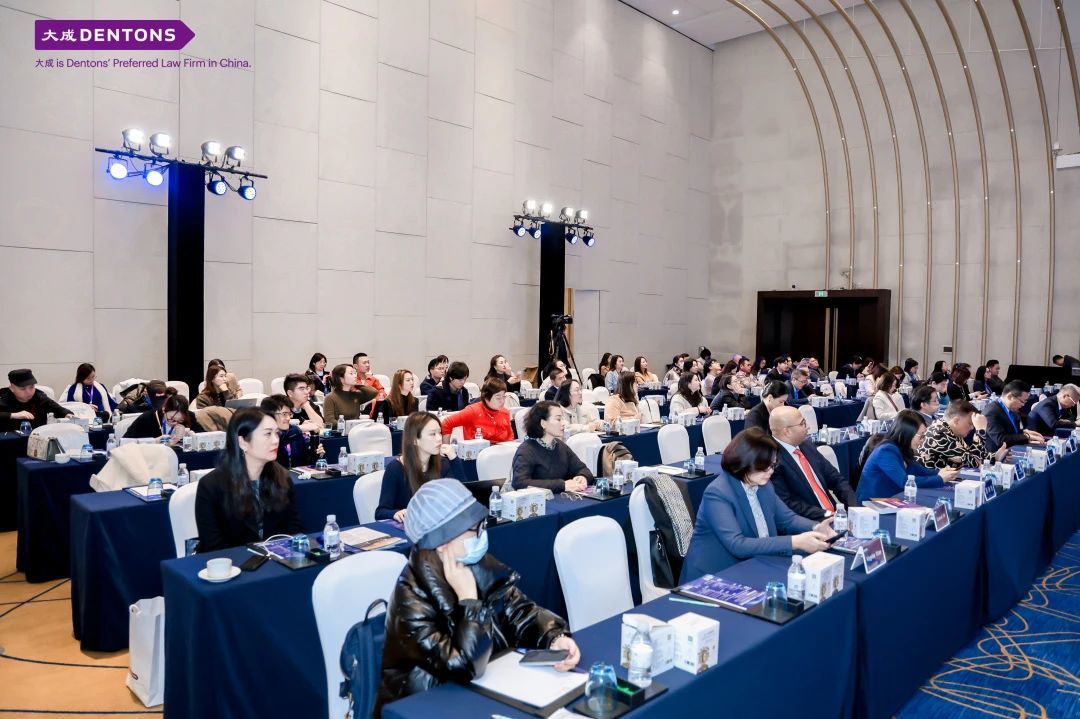
On-site photos
Related Lawyers





